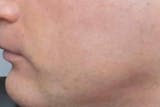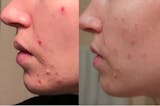The skin barrier function is compromised in eczema, allowing for increased water loss and trigger permeability.
Selecting the right moisturizer can reduce eczema flare-ups, the need for prescription medicine, and improve skin barrier strength.
Eczema, affecting millions of individuals globally, is a recurring skin condition typified by red, itchy, and inflamed skin outbreaks. The degree and length of these flare-ups are influenced by three key factors:
So why is moisturizing an essential part of eczema treatment? Let's dive deeper into the science of our skin to answer that question.
Our skin is not just a passive barrier; it is a dynamic organ with a fundamental role in our body's overall health. One of its primary functions is to act as a protective barrier, shielding us from external environmental factors, like irritants, allergens, and infectious agents. In individuals with eczema, this skin barrier function is compromised.
Even the healthy, non-flaring skin of those with eczema will show signs of having greater permeability and water loss (and therefore trigger pass-through).
Eczema moisturizers can support the skin in various ways:
Reduce dryness, irritation, and subsequent itching and trigger pass-through.(SET 2016)
Provide necessary hydration for skin healing (dry skin will struggle to produce the proteins needed to repair itself)
Create a physical barrier against triggers
Reduce inflammation (CAS 2006)
Nourish the microbiome, which in turn reduces inflammation and pathogens
Selecting the right moisturizer can reduce the number of flares, the amount of prescription medicine required to halt or relieve a flare, and promote barrier strength. (ZUU 2017)(GIR 2022)
JUMP TO SECTION:
Understanding the Types of Moisturizers for Eczema
When it comes to managing eczema, not all moisturizers are created equal. Various types of moisturizers are available on the market, each with its own unique formulation, texture, and benefits. Each has different properties that can make them more suitable for specific symptoms and situations.
In this section, we'll break down the differences between eczema creams, lotions, gels, and ointments, to help you make an informed choice about which product is right for your skin.
Eczema Lotions
Lotions have the lightest feel, spread easily, and dry quickly. There is no official definition of a “lotion” but, in general, they will have a lower oil content than creams and ointments - this will become important in our section on choosing the right product for you. Lotions are generally non-occlusive, meaning they do not form a water-tight barrier on the skin's surface.
Eczema Creams
Again, there is no official definition of creams, including aqueous creams, but they are generally made from a 50:50 oil to water ratio and are thicker than lotions. Although they may feel slightly greasy upon application, creams are generally non-greasy after absorption. Like lotions, creams are also non-occlusive.
Eczema Ointments
Ointments are the thickest moisturizers, often consisting of an oil to water ratio of something like 80:20. They create an occlusive layer on the skin, which can feel greasy, which may not be suitable for daytime use or for those with oily or acne-prone skin. However they can provide a longer-lasting barrier of oil to keep moisture in.
Eczema Gels
Gels contain no oils, making them non-greasy and easily absorbed, and a suitable option for those who are prone to acne. While eczema lotions, creams, and ointments all contain an oil as a primary tool for eczema relief, eczema gels often serve as a medium for delivering other ingredients to the skin.
Key Active Ingredients in Eczema Moisturizers
When it comes to managing eczema, the active ingredients in your chosen moisturizer can make a significant difference. Many lotions, creams, and ointments rely solely on the oil to provide lasting moisture and relief, but there are other “active” ingredients that can help as well. These ingredients may or may not provide a therapeutic effect for your version of eczema. In this section, we'll delve into some of the most common active ingredients found in eczema moisturizers and their benefits.
Ceramides
Ceramides are lipids (fats) that naturally occur in the skin and play a critical role in maintaining the skin's barrier function. Ceramides have a direct connection to the long-term nature and severity of eczema.
People with atopic dermatitis often have lower levels of long chain ceramides in their skin overall (even their healthy skin), than someone who does not have eczema. Not all ceramides are made equal though and they are often expensive. Learn more in our page about ceramides.
Hyaluronic Acid
Hyaluronic acid is a powerful humectant, meaning it draws moisture from the environment. This ingredient can hold up to 1,000 times its weight in water. Hyaluronic acid can help to alleviate the dryness associated with atopic dermatitis and enhance the skin's overall health and appearance.
Glycerin
Like hyaluronic acid, glycerin is a humectant that attracts water to the skin. It's commonly used in skincare products due to its ability to hydrate the skin and lock in moisture.
Colloidal Oatmeal
Colloidal oatmeal has been used for centuries to soothe itchy, irritated skin. It contains antioxidants and anti-inflammatory compounds that can help to reduce inflammation and itchiness in eczema-prone skin. Colloidal oatmeal also forms a protective barrier on the skin's surface, helping to retain moisture and protect against irritants.
Petrolatum (Petroleum Jelly)
Petrolatum (also known as petroleum jelly) is a highly effective occlusive ingredient. This means it forms a physical barrier on the skin to prevent water loss. While it doesn't provide moisture itself, it locks moisture in, making it a valuable ingredient for eczema sufferers with extremely dry skin.
Unfortunately, it is toxic to your microbiome, which is why it is often used in wound care. See our article on the microbiome to understand the impact that has on eczema.
Niacinamide
Niacinamide, or vitamin B3, is an ingredient that's gaining popularity in skincare due to its wide range of benefits. It helps to restore the skin's barrier function, improves skin texture, reduces inflammation, and even helps to reduce itchiness. This makes it a beneficial ingredient for those with eczema.
Aloe Vera
Aloe Vera is well-known for its soothing and anti-inflammatory properties, making it a common ingredient in skincare products for sensitive or irritated skin. It can help to calm inflammation, soothe itching, and provide lightweight hydration.
“Inactive” Ingredients
Most lotions, creams, and ointments incorporate oils to provide temporary hydration and to form a barrier on the skin. Typically, these skincare products feature petroleum-based oils.
Petroleum-based oils, while effective, can strangle the skin's microbiome, potentially prolonging an eczema flare-up.
Alternative options, like coconut oil, shea butter, or sunflower seed oil, can also be used, although their impact can vary depending on individual skin sensitivities.(VER 2008) Even though they are derived from natural sources, these oils and extracts can sometimes cause allergic reactions, as they may contain plant-based irritants.
Some manufacturers opt to try to extract the critical ingredients from the plant to avoid the irritants and allergens in the plant. However, impurities introduced during the extraction process might be present. Opting for raw, organic, and virgin oils could mitigate the risks of impurities, but individual reactions can still vary widely.
Choosing the Right Eczema Moisturizer
Navigating the world of eczema moisturizers can be overwhelming given the variety of options available. In this section, we will guide you on how to choose the right eczema moisturizer based on several factors, including the severity of your symptoms, your skin type, your sensitivity to ingredients, and your lifestyle.
Selecting the right moisturizer for your eczema treatment requires trial and error to determine what works best for your skin and type of eczema. This may change over time as your symptoms and needs evolve. Consider the following tips when choosing a moisturizer:
Factors to Consider
Assess your symptoms and the other treatments you are using: If using topical steroids, avoid occlusive moisturizers.
Avoid moisturizers with fragrance and colorings: they can irritate the skin.
Severity of Symptoms: The severity of your eczema should be a significant factor in your choice. For mild eczema, a lotion, gel, or serum targeting skin barrier concerns might suffice. For more severe eczema, a lotion including anti-inflammatory compounds may help.
Skin Type: If you have oily or acne-prone skin, you might want to opt for a gel, serum, or lotion, which is less likely to clog pores.
Lifestyle & Environment: Consider your daily routine and personal preferences. If you dislike the feeling of a heavy product on your skin during the day, you might prefer using a lighter lotion or gel in the morning and a thicker cream or ointment at night.
The Rulo Approach
In developing this article, we scrutinized the existing moisturizers in the market and kept finding concerns. We noticed an abundance of moisturizers that:
Included a myriad of ingredients, which were potential allergens or harmful to the skin's microbiome.
Heavily relied on oil for temporary skin protection, resulting in frequent reapplication.
Leveraged so-called "hero" ingredients to make claims, yet lacked significant scientific backing.
So we put our team to work to develop something that could:
Provide relief for dry, red skin that lasts.
Deliver just the right amount of hydration that the skin needs — not too much, not too little, and without the need for constant reapplication.
Maintain a healthy microbiome, avoid introducing new allergens or triggers, and use natural compounds that were sourced as purely as possible.
Our dedication and commitment to these principles have resulted in a line of products that we are truly proud of. We invite you to explore our product range and experience the Rulo difference for yourself.
Eczema and Allergies to Ingredients
Allergies are overreactions by the immune system to otherwise harmless compounds. Unfortunately allergies are all too common for people with eczema.
Moisturizers can come with a number of ingredients both active and inactive, natural and synthetic that could cause an allergic reaction. Look for moisturizers that are fragrance-free and hypoallergenic to minimize potential irritation.(NEM 2022) Be sure to patch test a small area to see if you are sensitive before diving in.
How to conduct a patch test:
Choose a small, discreet area of your skin, like the inside of your wrist or elbow.
Apply a small amount of the product to the selected area.
Wait for at least 24 hours to see if any reaction occurs. If there's no reaction, the product is likely safe for you to use. If you notice redness, irritation, or any other signs of a reaction, stop using the product immediately.
Repeat the process every time you introduce a new product into your routine.
Keep a log of the list of ingredients if you do have a reaction to a product. Try switching to another product and compare the ingredient list to try to identify which ingredient might be the culprit.
Proper Moisturizing Routine for Eczema
The act of moisturizing is simple, but understanding the nuances can make a significant difference in the effectiveness of your eczema treatment. Keep these key points in mind:
When to Moisturize
The most crucial time to apply your moisturizer is immediately after bathing, while your skin is still damp.
Some of the active ingredients work to “lock moisture” to the skin. On drier skin, this process can release energy and cause a stinging sensation. By using moisturizer while the skin is wet you:
Retain some of the moisture from the water already on the skin
Spread the moisturizer a little easier
Alleviate some of the stinging sensation.
How to Apply Eczema Moisturizers
Here's a step-by-step guide on how to apply your eczema moisturizer:
Apply to damp skin: As mentioned earlier, the best time to moisturize is after a bath or shower while your skin is still damp. Pat your skin dry with a towel instead of rubbing it, then apply your moisturizer.
Apply your moisturizer by gently smoothing it onto your skin in the direction of hair growth to avoid folliculitis (inflammation of the hair follicle). Don't rub it in as this can potentially irritate your skin and trigger a flare-up.
Use enough product: Be generous with your moisturizer. It should be applied in a thick layer, covering all areas of dry or affected skin.
Let it absorb: Give your skin time to absorb the moisturizer before getting dressed or applying any other skincare products. This usually takes a few minutes.
Wet wraps can be applied immediately after moisturizing.
Common Mistakes to Avoid
Here are some common mistakes to avoid when moisturizing your skin:
Not moisturizing often enough: If you have eczema, moisturizing once a day may not be enough. Listen to your skin, and if it feels dry or itchy, it is probably time to reapply your moisturizer.
Using the wrong type of moisturizer: As we have discussed, the type of moisturizer you use matters. Make sure you are using a moisturizer that's designed for eczema-prone skin and suits your skin type and severity of symptoms.
Applying moisturizer to dry skin: Always apply your moisturizer to damp skin to help lock in moisture. This is most effective immediately after a bath or shower.
Ignoring your triggers: Eczema is often triggered by specific factors, such as certain fabrics, fragrances, or allergens. Even the best moisturizing routine won't be fully effective if you do not also take steps to avoid your triggers.
In hot and humid weather, avoid using excessive ointment, as it can cause heat rash or discomfort due to skin overheating and reduced sweat effectiveness.
Avoid applying moisturizer to scratches, cuts, or scabs, as it may interfere with the healing process or increase the risk of infection.
Pro-Tips You Didn’t Think Of
Here are some insider tips to enhance your skincare routine and boost your skin's health:
Keep Moisturizer Handy: Whether you're at work, in the park, or traveling, always carry a small bottle or tube of your trusted moisturizer. Having it readily available allows for quick application whenever your skin feels dry or irritated.
Apply Moisturizer Proactively: Do not wait for your skin to show signs of dryness. Use moisturizers preemptively to protect your skin, especially before exposing it to harsh conditions. For instance, before swimming, apply a protective layer of ointment to any dry areas to shield them from the chlorine and other chemicals in pool water.
Use Moisturizers for Cleansing: This might sound unconventional, but moisturizers can be excellent gentle cleansers. Check out our washing page for more details on how to incorporate moisturizers into your cleansing routine.
Keep your moisturizer clean: opt for a squeezable moisturizer. Those in a jar can induce bacteria growth from touching it
Avoid Sodium Lauryl Sulfate: Sodium Lauryl Sulfate (SLS) is a common ingredient in many skincare products but it's a known skin irritant. Make it a habit to read the ingredients list of any new product and avoid those containing SLS.(TSA 2010)
Finding More Ways to Improve Eczema Symptoms
Moisturizing is a critical component of eczema treatment, but there are other methods and treatments that can help improve your symptoms. Explore additional treatment options such as dietary changes, stress reduction, and prescription medications to further enhance your eczema management.
By understanding your skin's unique needs and following a proper moisturizing routine, you can take control of your eczema and improve your quality of life.



